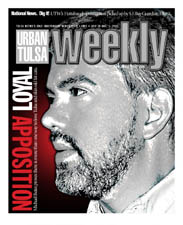BatesLine Tulsa blogroll headlines
Latest headlines from Tulsa blogs of interest, powered by Google Reader.
For the latest from all of BatesLine's favorite blogs, visit the BatesLine blogroll headlines page.
Visit the BatesLine Op-Ed Page for today's batch of columns from TownHall, National Review, American Spectator, and the Wall Street Journal.
For latest from a selection of Oklahoma blogs, visit the BatesLine Oklahoma headlines page.
In the spotlight
True history of the two million acres opened for settlement in the April 22, 1889, Land Run. No, the land wasn't stolen. American taxpayers paid millions for it, twice.
An essay from 2012. If you want to understand why the people who call the shots don't get much public criticism, you need to know about the people I call the yacht guests. "They staff the non-profits and the quangos, they run small service-oriented businesses that cater to the yacht owners, they're professionals who have the yacht owners as clients, they work as managers for the yacht owners' businesses. They may not be wealthy, but they're comfortable, and they have access to opportunities and perks that are out of financial reach for the folks who aren't on the yacht. Their main job is not to rock the boat, but from time to time, they're called upon to defend the yacht and its owners against perceived threats."
Introducing Tulsa's Complacent City Council
From 2011: "One of the things that seemed to annoy City Hall bureaucrats about the old council was their habit of raising new issues to be discussed, explored, and acted upon. From the bureaucrats' perspective, this meant more work and their own priorities displaced by the councilors' pet issues.... [The new councilors are] content to be spoon-fed information from the mayor, the department heads, and the members and staffers of authorities, boards, and commissions. The Complacent Councilors won't seek out alternative perspectives, and they'll be inclined to dismiss any alternative points of view that are brought to them by citizens, because those citizens aren't 'experts.' They'll vote the 'right' way every time, and the department heads, authority members, and mayoral assistants won't have to answer any questions that make them uncomfortable."
Beyond 1921
BatesLine has presented over a dozen stories on the history of Tulsa's Greenwood district, focusing on the overlooked history of the African-American city-within-a-city from its rebuilding following the 1921 massacre, the peak years of the '40s and '50s, and its second destruction by government through "urban renewal" and expressway construction. The linked article provides an overview, my 2009 Ignite Tulsa talk, and links to more detailed articles, photos, films, and resources.
Tulsa's vanished near northside
From 2015: "Having purged the cultural institutions and used them to brainwash those members of the public not firmly grounded in the truth, the Left is now purging the general public. You can believe the truth, but you have to behave as if the Left's delusions are true.
"Since the Left is finally being honest about the reality that some ethical viewpoint will control society, conservatives should not be shy about working to recapture the culture for the worldview and values that built a peaceful and prosperous civilization, while working to displace from positions of cultural influence the advocates of destructive doctrines that have led to an explosion of relational breakdown, mental illness, and violence."
Search
Contact
BatesLine Linkblog
Tulsa Appliance Parts & Supply
An uncompensated word of appreciation for Tulsa Appliance Parts & Supply, 9933 E 61st St., across the street from Union 6th & 7th Grade Center. They're in an old retail building that probably dates back to the 1950s if not earlier, from back when the entire Union school system was a little country school across the street. We needed a drum belt for our dryer, and they had it in stock. Ordering online would be easy, but buying in person keeps businesses like these going so you can get that part you need when you need it right away. (And a hearty well done to my son for getting the part installed and our dryer back up and running.)
When your child goes 'no contact' - by Graham Linehan
Heartbreaking stories of the cult-like patterns of transgenderism: "In The True Believer, Eric Hoffer explores how mass movements often seek to sever individuals from their existing social and familial ties to foster unwavering allegiance to the cause. He suggests that such movements thrive on the 'total surrender of a distinct self,' urging followers to subsume their personal identities into a collective whole. This process frequently involves the deliberate weakening or severing of familial bonds, as these personal connections can compete with the movement's demand for absolute loyalty/ideological unity. Previously, I asked to hear from parents whose children have chosen to go "no contact." Since then, I've received a cascade of messages from heartbroken parents, all the same, all different. Today, I'm sharing the first collection of these stories, each one a testament to the silent pain many families endure. More accounts will follow in the coming weeks. Thank you to everyone who bravely shared their stories; your voices matter, and you are not alone."
Good advice from Matthew Hurtt, Director of Professional Services at the Leadership Institute, for Washington newcomers: "What's a goober? It's that person who usually (not always) means well but just doesn't get it -- socially unaware, professionally clumsy, and often unintentionally burning bridges before they're even built.... Here are several things to remember to avoid being a goober in pursuit of building a reputation as someone to be taken seriously in Washington."
Watch Global & Local Live TV Online for Free - tv.garden
Parallel to the radio.garden website and app, this website provides easy access to open livestreams of TV stations around the world. Unfortunately, it doesn't provide radio.garden's interactive map browsing capability.
"Welcome to tv.garden, your gateway to free live TV streaming from anywhere. Our goal is to make discovering and watching global channels as easy and enjoyable as possible.... Fast, user-friendly, and completely free--no account needed, no hidden steps--just click and enjoy."
If you're going to have a shot at understanding the newly released JFK assassination files, you will need a glossary of the code names (cryptonyms) used in the memos.
Clear-channel station - Wikipedia
One of the pleasures of night-time driving is scanning the AM dial to pick up local broadcasts from across the nation. This article lists all 103 Class A (formerly Class 1-A, Class 1-B, and Class 1-N) medium-wave stations in North America: 57 in the lower 48, 16 in Alaska, 16 in Canada, 13 in Mexico, 1 in the Bahamas. Only 28 states and Washington DC have a clear-channel station. Oklahoma has two: KOTV (formerly KVOO) 1170, Tulsa, and KOKC (formerly KOMA) 1520, Oklahoma City.
The 21 states without a clear-channel station: Alabama, Arizona, Delaware, Florida, Hawaii, Idaho, Indiana, Kansas, Maine, Mississippi, Montana, Nebraska, Nevada, New Hampshire, New Jersey, North Dakota, Rhode Island, South Carolina, South Dakota, Vermont, Wisconsin, Wyoming. Five former clear-channel stations in Canada and Mexico have gone dark entirely; two in the US (WOWO 1190, Fort Wayne, Indiana; KGA 1510 Spokane, Washington) reduced power to allow stations on the same frequency to broadcast at night.
Blame It on Mr. Rogers: Why Young Adults Feel So Entitled - WSJ
Jeffrey Zaslow, writing in 2007: "Fred Rogers, the late TV icon, told several generations of children that they were "special" just for being whoever they were. He meant well, and he was a sterling role model in many ways. But what often got lost in his self-esteem-building patter was the idea that being special comes from working hard and having high expectations for yourself.
"Now Mr. Rogers, like Dr. Spock before him, has been targeted for re-evaluation. And he's not the only one. As educators and researchers struggle to define the new parameters of parenting, circa 2007, some are revisiting the language of child ego-boosting. What are the downsides of telling kids they're special? Is it a mistake to have children call us by our first names? When we focus all conversations on our children's lives, are we denying them the insights found when adults talk about adult things?"
In 1958, Prince Philip challenged students at Cambridge University to a battle of tiddlywinks for the benefit of the National Playing Fields Association. The Duke of Edinburgh did not appear for the competition; he recruited as his royal champions the stars of the Goon Show (Spike Milligan, Peter Sellers, Harry Secombe), announcer Wallace Greenslade, harmonicist Max Geldray, comedian Graham Stark, and comedy writers Ray Galton and Alan Simpson. The university students triumphed over the royal squad.
EXPLORE THE ATLAS -- National Zoning Atlas
This is a very cool idea: An online, interactive map showing zoning nationwide. Found via the Neighborhood Development group on Facebook, where group founder R. John Anderson warns:
"Heads up, this is a promising tool for general investigation, but fully understanding the underlying actual zoning ordinance in a specific municipality is critical. SO DO NOT PUT ANY PROPERTY UNDER CONTRACT BASED UPON THIS WHIZ BANG TECHNOLOGY. If you want to build/rebuild in that place, make it your goal to know that code better than the staff who administer it or the planning commission who interpret it."
Anderson urges prospective developers to pay attention to the procedural info typically at the front of the zoning code, definitions which may have subtle differences from one jurisdiction to another, e.g., how density and building height are calculated, what constitutes a family, what are parking minimums.
If you have a Newspapers.com subscription and you're interested in Tulsa history, this will take you to a special treat: A 16-page section celebrating the 10th anniversary of Associated Grocers. A-G was a cooperative of 110 independently-owned neighborhood grocery stores with joint wholesale grocery purchasing and joint newspaper advertising, trying to keep mom-and-pop stores competitive with the growing national chains. This section has a list of member stores and profiles of many of the store owners. A-G's 22,000 sq. ft. warehouse was at 1801 E. Jasper St., and there was a separate building for fruit and vegetable distribution at the North Trenton Street Market.
BatesLine Linkblog archives
Archives
Categories
- Blogosphere
- Bookshelf
- Cities
- Culture
- Education
- Faith
- Family
- General
- Global News
- History
- Journalism
- MIT
- Maps
- Music
- Oklahoma
- Oklahoma History
- Oklahoma Politics
- Oklahoma Weather
- Tribal Government
- Oral Roberts University
- Politics
- Technology
- Travel
- Tulsa
- Great Plains Airlines
- Arkansas River
- Re-Vision
- Tulsa City Hall
- Tulsa County
- Tulsa Crime
- Tulsa Dining
- Tulsa Downtown
- Tulsa Education
- Tulsa Election 2004
- Tulsa Election 2006
- Tulsa Election 2008
- Tulsa Election 2009
- Tulsa Election 2011
- Tulsa Election 2012
- Tulsa Election 2013
- Tulsa Election 2014
- Tulsa Election 2016
- Tulsa Election 2017
- Tulsa Election 2018
- Tulsa Election 2019
- Tulsa Election 2020
- Tulsa Election 2021
- Tulsa Election 2022
- Tulsa Election 2023
- Tulsa Election 2024
- Tulsa Election 2025
- Tulsa History
- Tulsa Media
- Tulsa Recall 2005
- Tulsa Vision 2025
- Tulsa Vision2
- Tulsa World
- Tulsa Zoning
- Tulsa suburbs
- Urban Tulsa Weekly
- Whimsy
Feeds
BatesLine links
Recent Posts
- Cold-case murder: Do Ada Jane Johnston's letters to Oral Roberts, other preachers survive?
- House 71, House 74 runoff
- Remembering Terrance Yeakey, Murrah Building first responder
- Murrah Building bombing 30th anniversary
- Battle of Lexington and Concord, 250th anniversary
- Lost in Tulsa newspapers
- Benedictine Sisters leave Monte Cassino School
- Phones are turning students into zombies
- April 2025 Oklahoma school board & municipal elections: BatesLine ballot card
- Tulsa Public Schools audit


